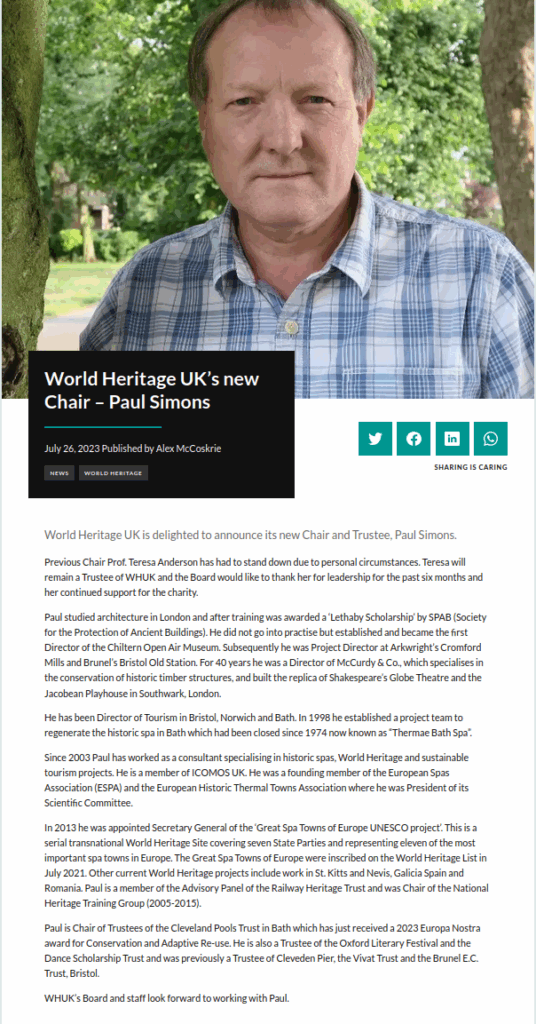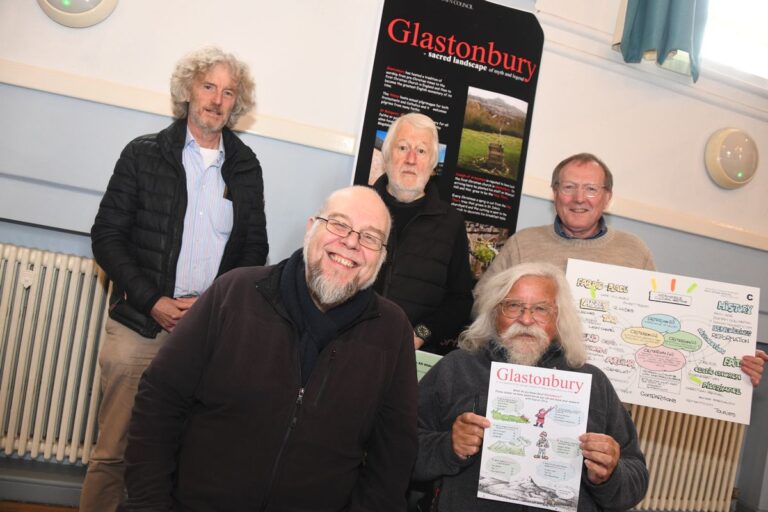The Capillary Wave

Glastonbury - Information Hub
Understand Law and Governance at: capillarywave.com
Introduction
This is a resource for various types of information surrounding officers acting for: SOMERSET COUNTY COUNCIL, GLASTONBURY TOWN COUNCIL, and consultants for: UNESCO and The WORLD HERITAGE UNITED KINGDOM
This page has only just been built and will be updated and added to daily/weekly
Clive Edwards’ Talk At Glastonbury November 2025
- Government – God – Glastonbury – Myth And Legend
Clive Edwards Links:
Contents:
- HM Government
- Glastonbury Town Deal
- SOMERSET COUNCIL
- Constitution
- Public Statements
- Miscellaneous
- GLASTONBURY TOWN COUNCIL
- Meeting Minutes
- Town Hall Meeting Number Four – WORLD HERITAGE consultation
- Public Statements
- Miscellaneous
- WORLD HERITAGE UNITED KINGDOM
- UNESCO
- Media
- Glastonbury – London 2012 Olympics
- Groups Against WORLD HERITAGE For Glastonbury
HM Government – Glastonbury Town Deal
SOMERSET COUNTY COUNCIL

England’s ‘quirkiest town’ wants to protect its unique identity
By Lewis Clarke – somersetlive.co.uk/news/somerset-news/englands-quirkest-town-wants-protect-9641510
A Somerset photographer has captured an incredible nighttime view of Glastonbury Tor. Michelle Cowbourne ventured out after 2am on Monday (7 Oct) to try and snap Northern lights. She explains: “I have an aurora alert app that goes off if the likelihood of seeing the aurora increases to a red alert. At 1am it peaked red. I looked out of the window and saw it was clear with lots of stars so thought I would take a chance and go up the Tor. I didn’t get the Northern lights but still plenty of atmosphere in the night sky.”
In a town where ancient legends and modern beliefs intertwine, Glastonbury now contemplates the tangible legacy of becoming a UNESCO World Heritage site.

On Sunday, October 13, the town held its World Heritage Day, drawing local officials, residents, and visitors to discuss a topic that has simmered for years; could and should Glastonbury earn a place on UNESCO’s prestigious World Heritage list?
For Glastonbury—a town celebrated for its unique blend of historic, spiritual, and cultural heritage—the possibility of World Heritage designation carries both the promise of recognition and a myriad of questions and challenges.
For centuries, Glastonbury has held a place in both legend and history, from its connections to King Arthur and the Holy Grail to its stunning Tor and historic Abbey.
Known as a centre for pilgrimage, spirituality, and alternative culture, Glastonbury’s fame has only grown in recent years, especially as visitors increased following the COVID-19 pandemic.
Jon Cousins, a town councillor and prominent advocate for the heritage bid said: “A lot more people from Great Britain started coming as tourists to the town, and now the people from abroad are coming back again.”
This background provides an essential context as Glastonbury explores UNESCO World Heritage status, which could bring global recognition and additional resources to protect and manage its heritage assets.
UNESCO, the United Nations Educational, Scientific and Cultural Organisation, began its World Heritage list in 1972 to safeguard places of “outstanding universal value” for future generations. Today, the list includes over 1,000 sites worldwide, ranging from cultural landmarks like the Pyramids of Egypt to natural wonders such as the Great Barrier Reef. Securing a place on this list can bring a wealth of benefits, from enhanced tourism and conservation support to global recognition, but it requires a rigorous and lengthy application process
L-R – (Back) Councillor Paul Manning, consultant Chris Pound, Consultant Paul Simons (Front) Coucillor Jon Cousins, Councillor Michael White, deputy mayor of Glastonbury In the South West, the great spa town of Bath, Stonehenge, and the Dorset and East Devon Jurassic Coast each have a claim to being a UNESCO World Heritage site.
Chris Pound, a consultant and seasoned World Heritage project manager who worked with Bath City on their bid, spoke about the town’s journey ahead: “We have to prepare a draft proposal for our government to consider that Glastonbury is worthy of pushing forward to UNESCO,” he said. “Today was a first opportunity to engage the local community. We know Glastonbury is a place of many opinions, and that was expressed today.”
The event sparked a range of responses, highlighting the spectrum of local views on the potential designation. While some see it as a strategic opportunity, others raise concerns about how World Heritage status might affect Glastonbury’s already distinctive character.
Councillor Michael White reflected on the unique community dynamics saying: “Glastonbury itself is an interesting town because we have the old established families and then we have the entire traveling new age alternative,” he said. “It is home to one of the poorest wards in Britain in terms of health, education, and jobs.”
For Cllr White, the question of World Heritage status is as much about preserving the town’s identity as it is about managing the impact of an influx of visitors drawn by its spiritual and cultural allure.
“People come for pilgrimages,” he said, “just because they get called here and they say they don’t know why they’re here, but something tells them to come.”
This mystical magnetism has sustained the town’s tourist economy for years, but the increase in visitors has highlighted the need for a coherent strategy.
Cllr Cousins echoed this need, citing issues such as parking shortages and strained local resources during peak visitor periods.
“Part of the Town Deal initially thought of having a park and ride in Glastonbury, but it is something that we still have to return to,” he explained.
For him, the UNESCO bid could serve as a “strategic opportunity as a council to look at the visitor numbers and how we deal with that.”
The prospect of World Heritage status goes beyond tourism, presenting an opportunity to boost the local economy and address socioeconomic disparities within the community.
“Clearly, the wealth that’s being attracted to the town isn’t being received by all the people who live in the town,” Cllr Cousins added, saying that any economic growth benefits the entire community.
By connecting Glastonbury to UNESCO’s global network, local officials hope to draw greater investment and develop sustainable tourism practices that can address these challenges.
The proposed status could also facilitate local and national partnerships to promote Glastonbury’s heritage in a managed, responsible way, ideally fostering “a truly partnership and community approach,” Cllr Pound said.
Yet World Heritage status is neither quick nor inexpensive to obtain.
“It’s a slow process,” said Mr Pound, “It takes a number of years. At the moment, the town council is taking it forward on the basis of its opportunities identified in the new Neighborhood Plan.”
The earliest potential timeline for inclusion on UNESCO’s list is seven years—a process dependent on thorough documentation and the unwavering support of both government bodies and the local community.
Mr Pound continued: “The next steps involve a detailed assessment of Glastonbury’s cultural heritage values and the physical evidence that substantiates them.”
Cllr Cousins concluded: “If our community is not in favour of it, then our exploration will have at least been productive in one way, which is to find that out and maybe it will be put to bed for another ten years.”
GLASTONBURY TOWN COUNCIL
Glastonbury Town Council’s Missing Minutes of a Meeting – Now Found:
Glastonbury Town Council Investment Plan: